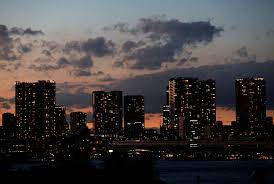For the third consecutive year, Tokyo has experienced record-breaking apartment prices, driven by a combination of low supply and escalating construction costs. In 2023, the average price of a new condominium for sale in Tokyo and its surrounding areas surged by 29%, reaching a new high of 81 million yen ($548,000), according to data from the Real Estate Economic Institute, which has been monitoring this data since 1973.

The upward trajectory in new condo values has persisted for five consecutive years. Analysts predict that this trend will likely continue in 2024, despite a slowdown in the economy and the Bank of Japan’s potential shift away from its longstanding negative interest-rate policy, which has historically made home loans more affordable.
Shun Ogishima, a researcher at Sumitomo Mitsui Trust Research Institute, pointed out that the primary driving force behind this price growth is the surge in construction costs. The costs of raw materials such as steel have risen significantly, and wages for construction workers have increased due to labor shortages. Consequently, developers supplying condos have been compelled to continually raise prices.
The decrease in supply has also played a role, with the number of new units available for sale in the Tokyo metropolitan area dropping by 9.1% last year. However, there is an expectation of a rebound in supply in 2024, as per a report released Thursday. In central Tokyo, where average prices of new condos slightly declined in 2022, there was a notable jump of 39%, reaching 114.8 million yen.
Several factors, including the sale of high-end properties and the rise of dual-income households, contribute to this increase, according to Ogishima. Notably, the number of apartments selling for over 100 million yen increased by 68% last year, as revealed in the report.
Despite the ultra-easy monetary policy adopted by the Bank of Japan, local homebuyers continue to benefit from rock-bottom mortgage rates. The increase in condo prices reflects a broader trend of inflation taking hold in Japan after decades of deflationary pressure, stemming from a housing market collapse in the early 1990s. The Bank of Japan is considering exiting its negative interest-rate policy, but analysts believe that any potential changes are unlikely to have a significant impact on mortgage costs or the demand for apartments, given the competition among banks for home-loan customers.
Tetsuya Kaneko, the head of research at real estate company Savills Japan, noted, “Even if rates went up a little, people might think it’s better to buy now rather than later.”









